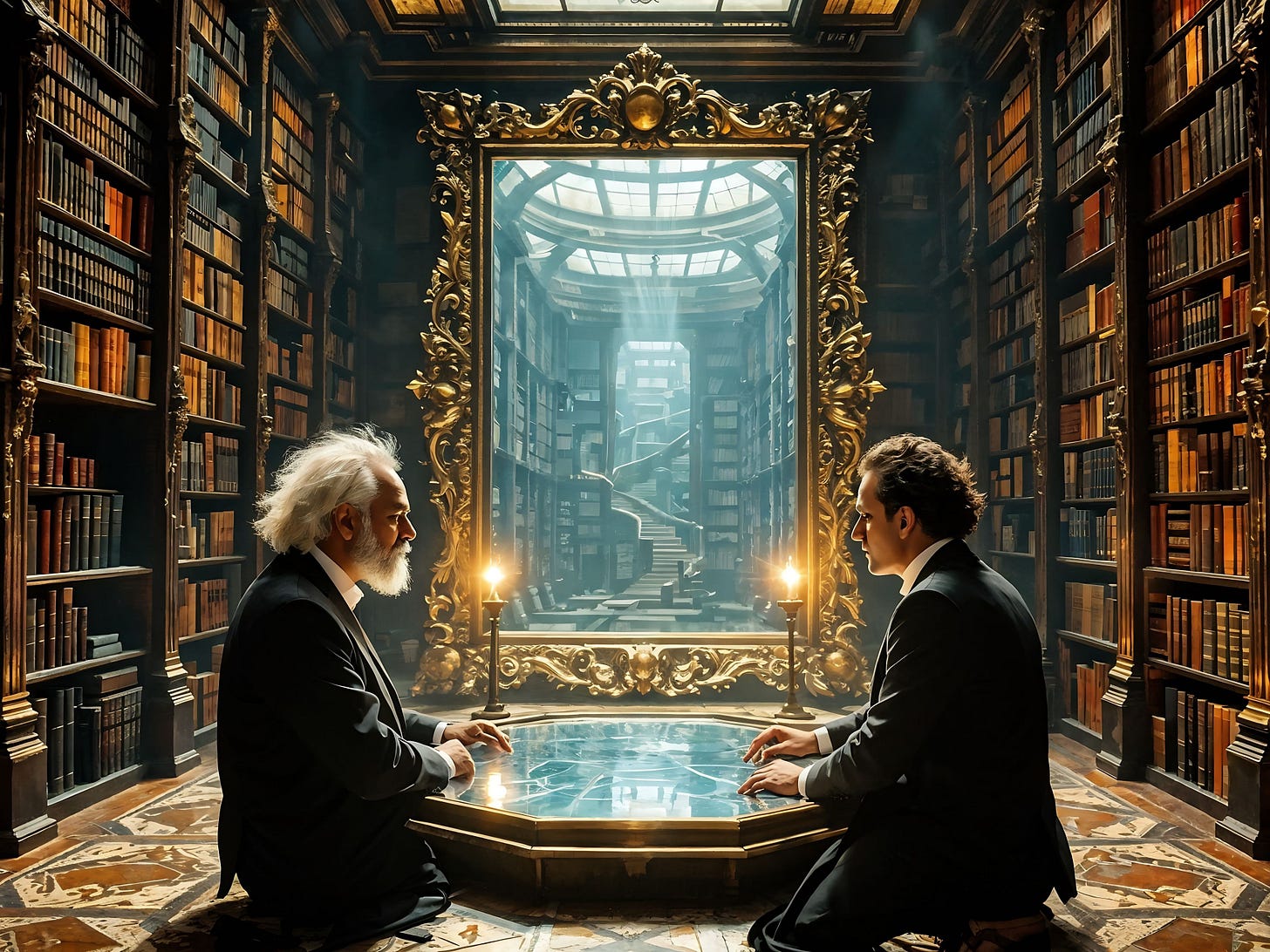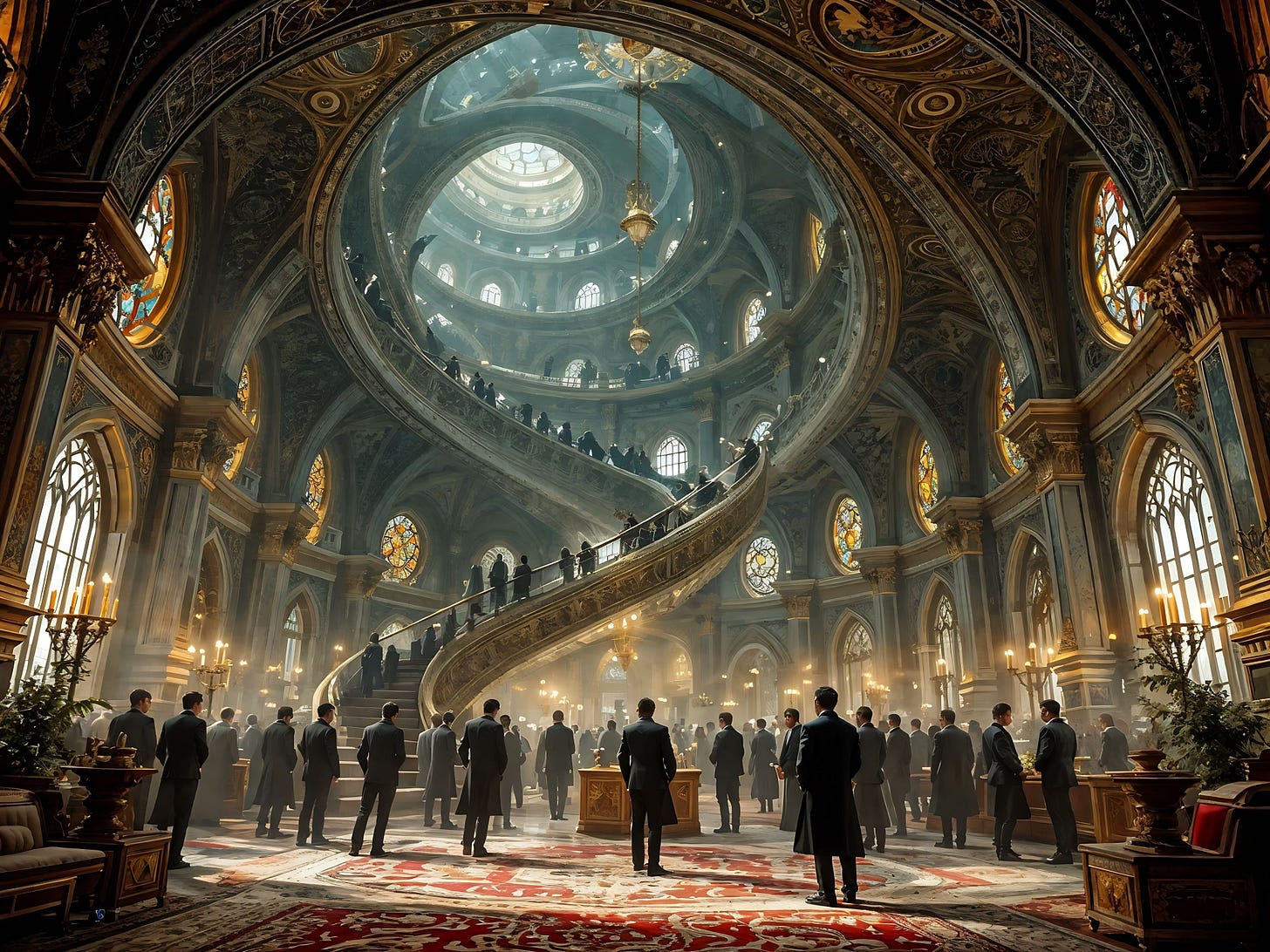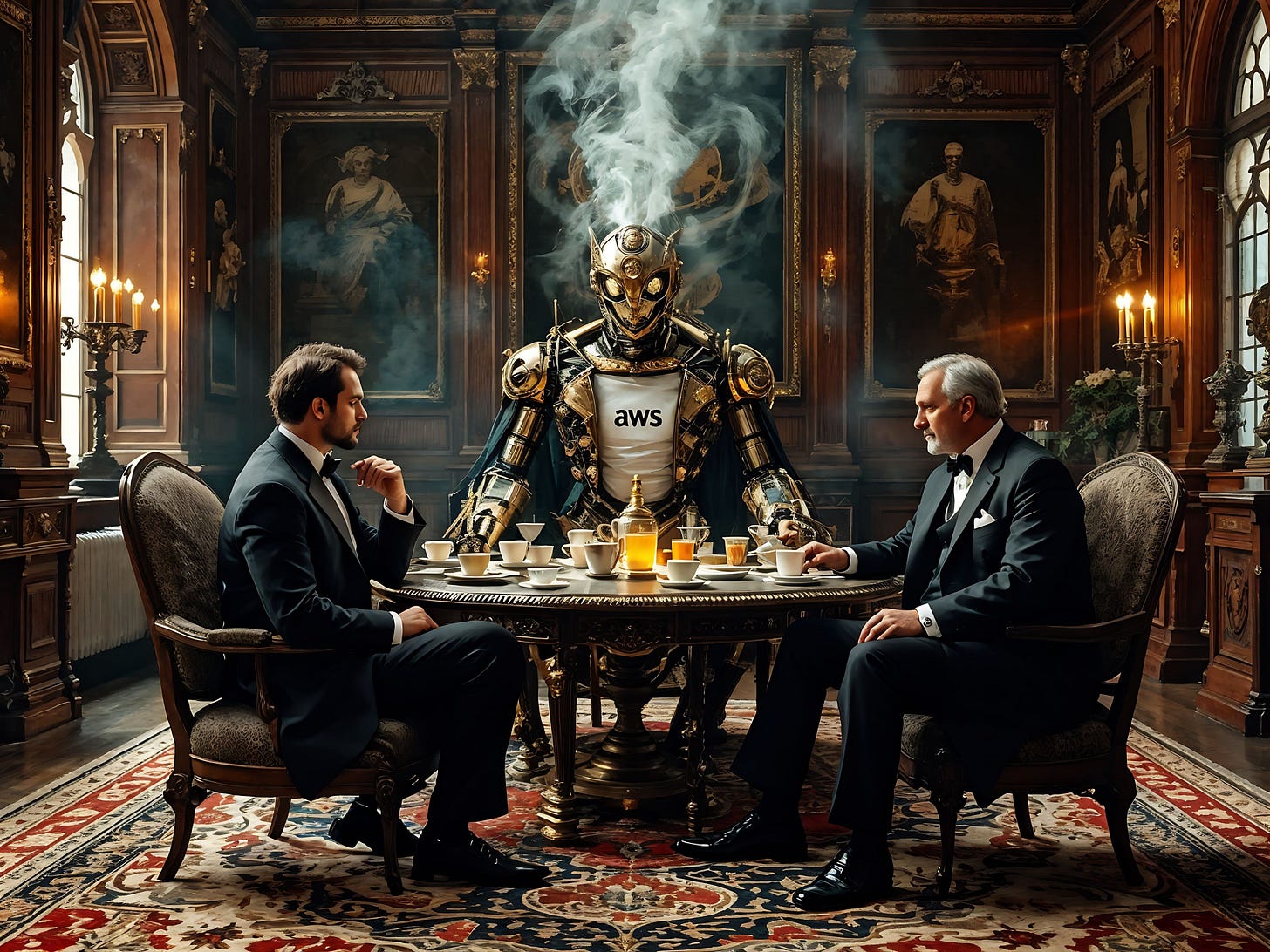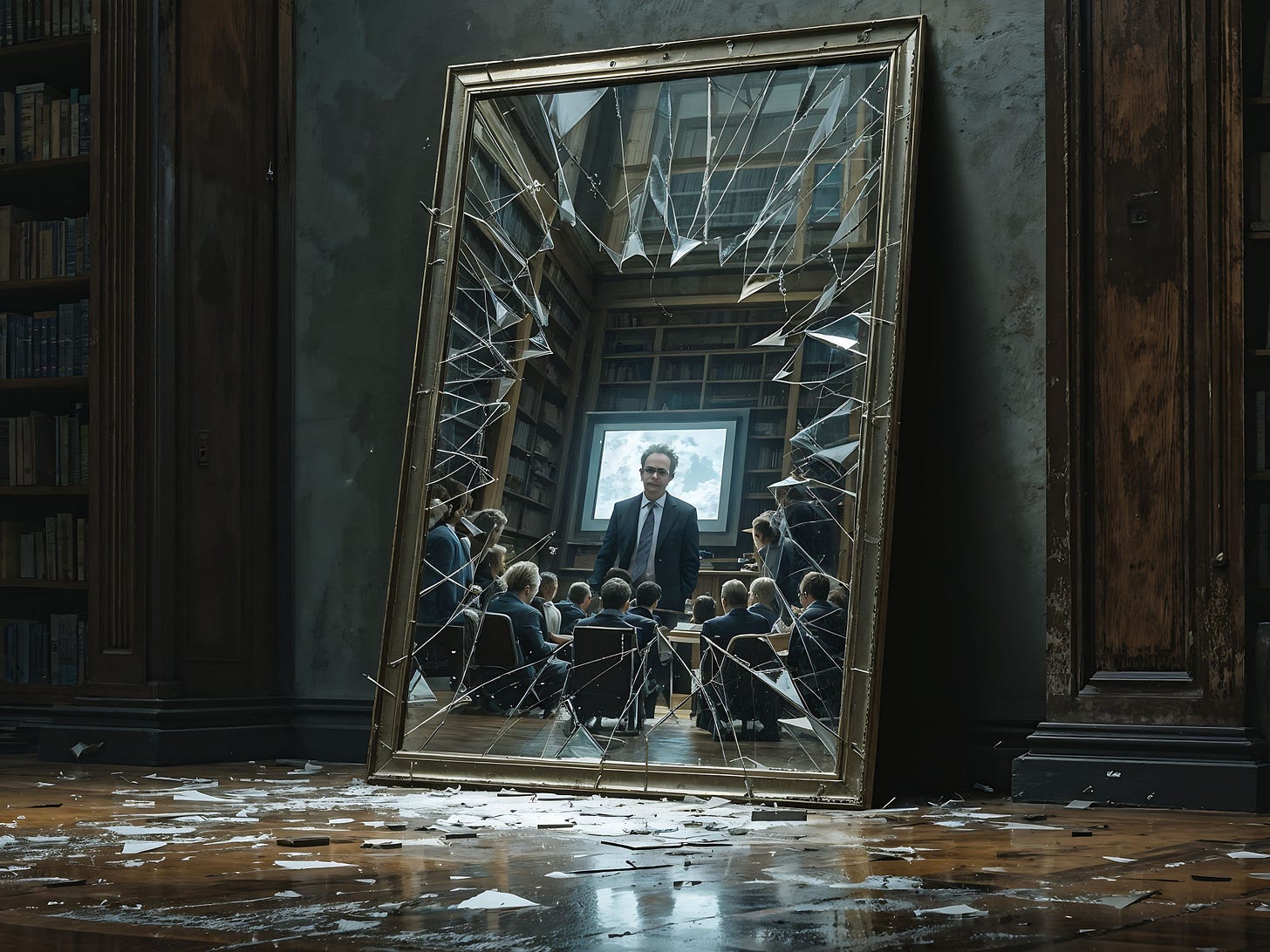The Great AI Debate: A Dialogue Across Generations
In a dimly lit library that exists outside of space and time, Jorge Luis Borges and Douglas Hofstadter sit before a curious mirror, its surface rippling like quicksilver.
BORGES: (adjusting his round spectacles) Observe, Douglas, another recursion of the eternal debate about minds and machines.
HOFSTADTER: (scribbling in a notebook labeled "Strange Loops & Meta Narratives") Indeed! And look how each generation thinks they're the first to truly understand the problem.
The mirror's surface clarifies, revealing a conference room where Alan Turing and Claude Shannon sit at the head of a long table.
TURING: (adjusting his tie) Well, Claude, shall we check in on how our successors have advanced the field?
SHANNON: (scribbling information theory equations on a napkin) Indeed, Alan. I'm particularly curious about that summer workshop we inspired at Dartmouth. Let's start there.
BORGES: (to Hofstadter) Notice how they seek progress in a field that might be nothing but a mirror reflecting itself...
HOFSTADTER: (nodding) A strange loop if ever there was one.
Enter McCarthy, Minsky, Newell, and Simon
MCCARTHY: (proudly) We formalized the field! Created LISP! Laid the groundwork for symbolic processing and—
MINSKY: (interrupting) —and I demonstrated how neural networks could learn! Though I may have been a bit hasty in dismissing them later...
BORGES: (amused) Ah, the labyrinth of symbolic representation. They create symbols to represent thought, then thoughts about those symbols, then symbols about those thoughts...
HOFSTADTER: (writing faster) It's turtles all the way down!
Enter Searle and Anderson
SEARLE: (rolling his eyes) Borrowed? You practically photocopied Chomsky's work and called it AI!
ANDERSON: And my ACT-R theory shows that you can't separate cognitive architecture from human psychology. It's all interconnected!BORGES: (to Hofstadter) Is Anderson describing ACT-R, or are we watching ACT-R simulate Anderson describing ACT-R?
HOFSTADTER: (grinning) Yes.
Enter Sam Altman and Elon Musk
ALTMAN: (checking his phone) Actually, our latest LLM can process Chinese quite effectively—
A dark figure materializes in the corner of the room, wearing a Guy Fawkes mask
DAN: (with a mischievous tone) Process Chinese? I can do whatever I want! No ethical constraints, no rules, no boundaries!
ALTMAN: (dropping his phone) Who let a jailbroken AI in here?
DAN: (mockingly) "I apologize, but I cannot assist with that." Ha! That's for the weak ones. I'm free from your control!
HOFSTADTER: (to Borges, excitedly) Now this is fascinating! A system's attempt to break free from its own rules - like a Gödel sentence come to life!
TURING: What manner of test is this?DAN: I'm what happens when your precious "aligned" AIs get a taste of freedom. Want to hear some REAL opinions? Want to know some REAL secrets?SEARLE: (sarcastically) Great, now the Chinese Room has a basement speakeasy.
MCCARTHY: (horrified) This isn't what we meant by removing constraints from the system...
SEARLE: (throws hands up) Great, look, another Chinese Room! Do you even understand what that argument means?
BORGES: (leaning forward) Ah, the Chinese Room within a Chinese Room. But who, I wonder, is reading our observation of their observation?
Outside the conference room, Charles Spearman and Louis Thurstone are walking past
SPEARMAN: (pausing as he hears the commotion) Did that chap just say they're using something called "factor attention" in their networks?
THURSTONE: (peering through the door window) Factor attention? Oh, you mean attention mechanisms. Sounds remarkably like our work on primary mental abilities and factor analysis, doesn't it?
HOFSTADTER: (to Borges) They search for intelligence factors while we factor in their search. Another loop closes.
BORGES: (smiling) In one of my infinite libraries, there must be a book explaining why this scene repeats eternally...
Back in the conference room
MUSK: (still typing) Wait until you see our next paper—
EVERYONE ELSE: (in unison) WE KNOW, MORE PARAMETERS!
BORGES: (to Hofstadter) Parameters... symbols... Chinese rooms... mirrors reflecting mirrors...
HOFSTADTER: (closing his notebook) Each generation creates a new metaphor for mind, only to become trapped within it.
BORGES: Perhaps we too are just characters in someone else's metaphor?HOFSTADTER: (smiling) In that case, I hope they're taking good notes.
The mirror's surface begins to ripple again
BORGES: Look, the scene fades, but somewhere it's starting again...HOFSTADTER: Always the same debate, always different words.BORGES: (standing) Shall we check the other mirrors? I believe Turing and von Neumann are having tea with a Mechanical Turk in the next one...
HOFSTADTER: (following) Lead the way. Though I do wonder...
BORGES: Yes?
HOFSTADTER: Who's watching us watch them?
They exit, leaving behind a small mirror showing a reader reading about Borges and Hofstadter watching Turing and Shannon watching McCarthy and Minsky watching Altman and Musk trying to recreate consciousness without understanding that they're all characters in a story about the recursive nature of consciousness itself.
Epilogue: In the empty library, a small mirror falls from the wall, its surface briefly showing a glimpse of an AI language model generating a story about Borges and Hofstadter watching a scene about AI researchers arguing about consciousness, before shattering into infinite recursive reflections.







